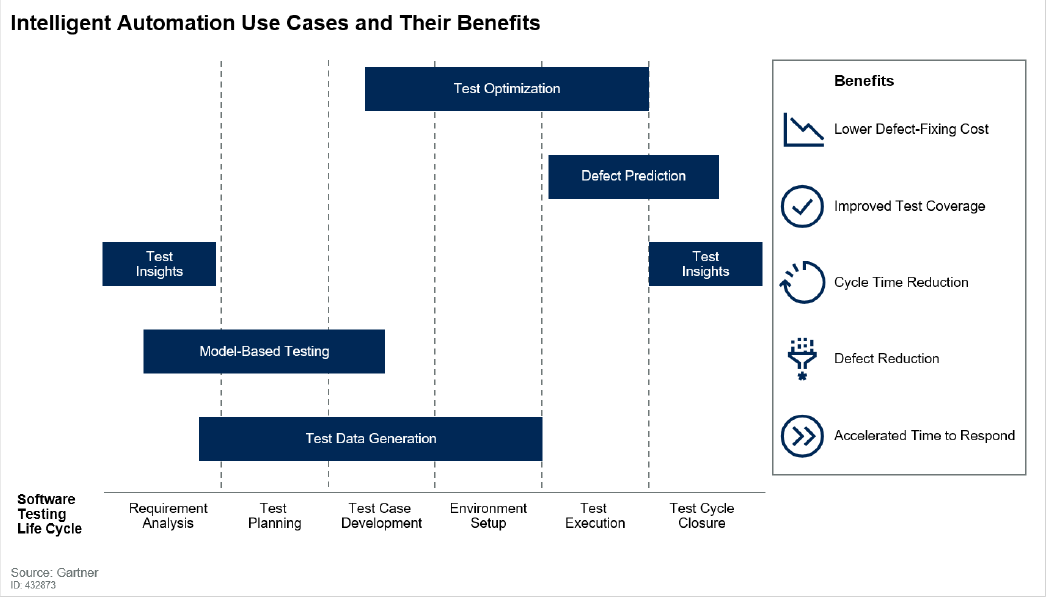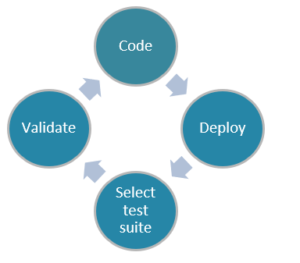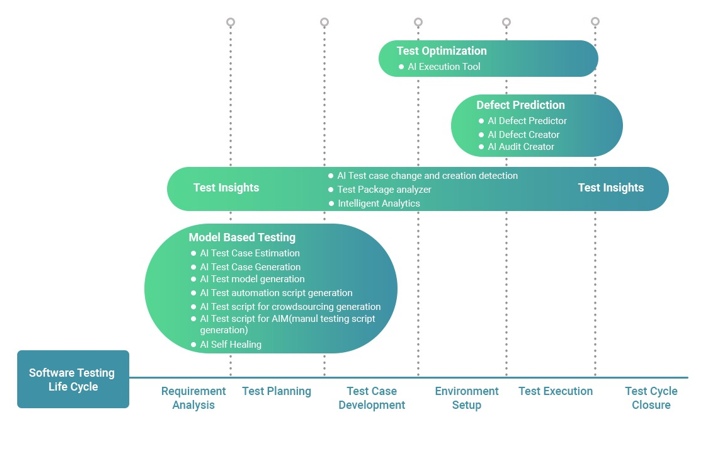Accelerate Success with AI-Powered Test Automation – Smarter, Faster, Flawless
Start free trialIntelligent Automation: Increasing the value of automation testing
Imagine having the ability to self evolve and heal whenever there is an impediment – helping you to adapt to the change and also increase efficiency and productivity. When the key differentiator to any business in this competitive digital era is achieving end-user satisfaction, delivering “quality-at-speed” plays a crucial role in achieving it. In the last few years, there has been a conscious effort in the world of software testing to translate the manual test cases to automated testing to achieve Quality-at-Speed, lower the risk factor and improve the test coverage.
With the advent of automation, manually intensive tasks are being executed faster with reduced human errors. Test Automation is a method in software testing that leverages automation tools to control the execution of tests. Test automation is also called automated testing or automated QA testing. Ultimately, Automation tools are best suited for tasks, processes and workflows that have repeatable, predictable interactions with other IT applications.
The value of Automation in today’s world is far greater than ever. It may have started with a goal to reduce the costs for repetitive tasks. However, automating just to reduce cost is not what automation is all about. In fact, the journey gets all the more exciting with disruptive technologies like Artificial Intelligence and Machine Learning, which take automation to the next level!
Unlike Automation, which is designed to automate routine, repetitive tasks, intelligent automation goes a step further and provides the capability to automate non-routine tasks by leveraging AI and ML to redefine the ways of Software Testing and solve complex problems.
So, what exactly is Intelligent Automation?
Intelligent Automation is a layer on top of the normal automation that fixes most of the problems in automation, helps reduce human work and gain new capabilities beyond human abilities.

To gain a clear overview of the key differences, let’s compare the two terms on key parameters:
| Parameters | Automation | Intelligent Automation |
| Technology and Focus on process | Automation is process-driven. Focuses on automating repetitive and, rule-based processes | IA is all about data-driven processes, Incorporates artificial intelligence (AI) and Machine learning (ML) technologies |
| Test case generation and maintenance | Test Automation cases are high maintenance and are not reusable resulting in higher maintenance costs and lower test case generation efficiency | Uses Model based testing. TDD/BDD approach is used and the test cases are generated and maintained automatically resulting in reduced maintenance cost |
| Ability of self evolve | Follows rules to automate the tasks that has no variations, is restricted to repetitive tasks | Learns and adapts to data in real-time with the self-healing capability . |
Now that we are clear on the key differences, let’s explore the use cases for Intelligent Automation in Testing services.

Intelligent Automation Use Cases
In “Predicts 2018: Application Development,” Gartner forecast that applying AI and machine learning to quality assurance (QA) will help identify how AI technologies can support new ways of working in DevOps, mobile and IoT environments. By 2022, 40% of application development (AD) projects will use AI-enabled test set optimizers that build, maintain, run and optimize test assets
Gartner recommends that organizations should Increase application testing agility by working with application leaders to explore IA use cases, such as test optimization, defect prediction, model-based testing, test data generation and test insights.

Intelligent Automation with Webomates- What makes Webomates stand apart!
Explore Speed, scalability and predictability with Webomates Testing-as-a-service patented AI testing platform. With this platform, we are at the forefront of Intelligent Automation.
- Model based testing: An automated design of test cases from a model.
In the traditional model of testing, testers write the test cases based on the requirements. However, at times the requirements are ambiguous or they keep changing frequently resulting in poor quality test cases. A model based testing approach addresses these challenges by automatically generating the test cases and scripts from a model.
The definition of MBT in Wikipedia: “Model-based testing is software testing in which test cases are derived in whole or in part from a model that describes some (usually functional) aspects of the system under test (SUT).“
Test as you Develop
Webomates CQ Human assisted platform goes through the application to generate the baseline test cases. Using its advanced AI, it creates up to 2,000 test cases in 4 weeks that are relevant, appropriate for the existing release and will be relevant for the new release and software version. This automated way of designing test cases results in increased test coverage.
Webomates advanced humans assisted AI system creates hundreds or thousands of test scenarios, runs the tests and provides the user with pass/fail reports, triages the pass/fail results and identifies and creates defects for the user of the platform to review.

- Defect prediction
Whenever an automation test suite is executed, the result is a pass or fail report, depending on whether the actual result matches the expected result or not. However, a failure can also be a False Fail which means there may be no defect and the system may be working as expected. False Fails means that it is unclear whether the test case has passed or failed. A lot of time is spent in understanding whether or not there is an actual defect in the system.
AI Defect Predictor tool – Know your defect in 20 seconds!
To avoid the massive amounts of time spent in analyzing the defect, Webomates created an AI Defect Predictor tool that shares true Pass and true Fail reports with the development team along with an in-depth analysis of automation failures to help them reduce their triage time.
For 300 test cases with a failure rate of 35% (105 failed test cases), it usually takes 12 hours to triage the results and identify the false positives. Using the Defect Predictor, the time taken drastically reduces to 3-4 hours.
Webomates shares a comprehensive triaged defect report that includes:- Defect Summary
- Steps for replicating the defect
- Video of the actual bug instances
- Priority suggestion
- Test cases mapped with the defect
Webomates thus helps the teams deliver higher quality releases while saving thousands of hours removing roadblocks and drag on productivity.
- Test optimization
Test optimization refers to making the test process more time and cost-efficient without compromising the accuracy of results.
Imagine you have created 5 web pages however there are changes done only to 2 of those web pages. Do you need to run all test cases? No! You just identify the test cases that are modified and run only those cases! You need to run the right tests at the right time. But that’s just not enough!
At Webomates, we follow the mantra of – Right tests at the right time, in the right way!
Our platform is designed to reduce test cycle duration and mission critical defects by more than 50% by applying Machine Learning and Artificial Intelligence to software testing. The testing is optimized by combining the patented AI testing platform using multiple channels of execution like Automation and AI with crowdsourcing and manual testing.
- Test Insights
Test Insights gives you the analytics from the system of patterns inside the product. It helps you find the locus of defects. Once you have insights into the defect inducing changes, you can facilitate the defect fixing process.
In a Snapshot – The Webomates’ AI Impact
14 AI Engines
5 Patents Granted
5 Patents Pending

There are 14 AI tools that are used in the entire life cycle right from test case estimation, test case generation and test model generation to reduce the overall set up time from months to weeks and optimize application testing for quality and speed using Intelligent Automation. We help to accelerate value to customers by empowering the QA teams with such real-time self-healing capabilities using the new-age intelligent technologies and help in realizing the true business value and also empower the organizations in providing value to the customer.
- 100% execution of test cases
- 200% increase in Development Efficiency
- 11x increase in Feature Velocity
- 90% Reduction in Defects reported by end users
Conclusion
The power combination of Webomates AI and ML powered Testing along with Shift-left testing approach is bringing a revolutionary change in the testing era to create a more focused application development.
To maximize the benefits, Webomates CQ believes that following a formal quality assurance process is imperative for a successful release. This gives organizations the capability to focus more on the business value and customer experience.
Our QA team embeds intelligent automation and continuous testing principles right across the software delivery pipeline. With a perfect blend of Agile, DevOps, patented AI Defect Predictor tool and a test automation framework, Webomates can help you achieve a hassle-free release, every time!
Tags: Artificial Intelligence, Automation Testing, Intelligent Analytics, IntelligentAnalytics

Leave a Reply